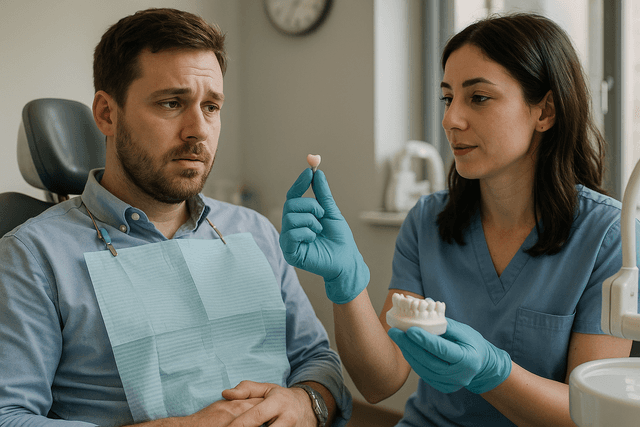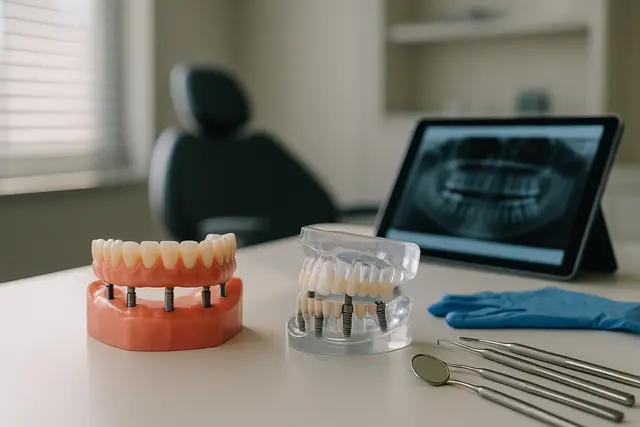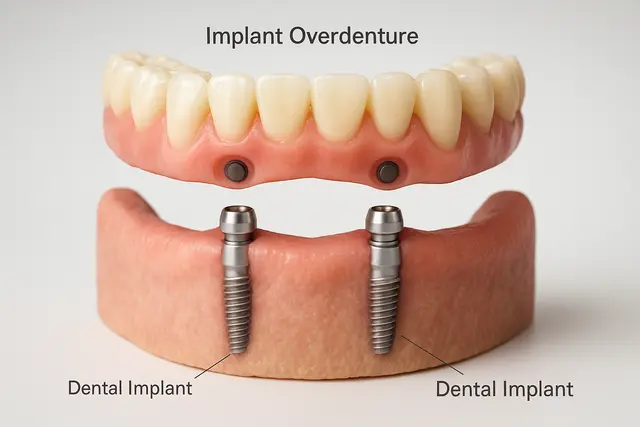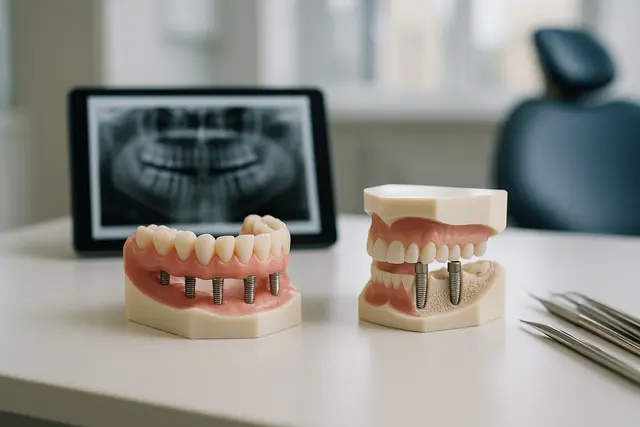Prosthodontics
6 min read
Jun 09, 2025
How Long Do Dental Crowns Take? Key Info Before Your Dental Visit
If you’re about to get a dental crown, you’re probably wondering one thing first: how long does the whole process actually take? Whether it’s your first crown or just the first one in a while, it helps to know what to expect before your dental visit.

If your dentist just told you that you need a crown, you might be wondering how long this whole thing is going to take. Are we talking about a quick lunchtime fix? Or weeks of awkward temporary crowns and repeat visits? The short answer is... it depends. But don’t worry, we’re here to unpack the process so you know exactly what to expect before you hop into that dental chair.
Let’s walk through everything from the basics to timing so you feel prepared and in control of your smile.
Crown: What Is It, Anyway?
A crown, also known as a tooth cap, is a custom-made cover that fits snugly over an existing tooth. It restores the shape, strength, and look of a tooth that’s too damaged to be fixed with a simple dental filling. Think of it as protective armor for a weakened tooth.
Crowns are made to match your natural tooth enamel, blending in so well that no one will spot the difference. They are also used with dental bridges and dental implants to replace missing or damaged teeth.
Dental Crown: When Do You Need One?
A dental crown is often recommended when your tooth structure has been seriously compromised. This could be due to extensive decay, cracks, or a large filling that’s failing. Your dentist might also suggest one if you’ve had a root canal or need to protect a dental implant.
So if your dentist tells you that you need a dental crown, it’s about saving your affected tooth from further damage and keeping your mouth healthy.
Dental Crown Procedure: The Basics
Here’s where the rubber meets the road. The dental crown procedure usually takes two visits unless you’re lucky enough to have a dentist who offers a same-day crown option (we’ll get to that in a bit).
First, your tooth will be examined and prepped. If the tooth is badly decayed or broken, your dentist might recommend a root canal first to clean out any infection and strengthen the tooth root.
Next, your dentist will remove any decay, old fillings, or damaged portions of the tooth to prepare your tooth for its new crown. They’ll then take impressions of your teeth or take digital scans to make the crown fit perfectly.
At this point, your dentist will place a temporary crown to protect the tooth while your permanent crown is being crafted in a dental lab. The whole crown placement process may take 2 to 3 weeks if you’re going the traditional route.
Same-Day Crown: A Faster Option
If you hate the idea of waiting, ask your dentist whether your dental office offers a same-day crown option. These are often created with CEREC crown technology, allowing the dentist to make the crown in-office while you wait.
In this case, the dental crown process usually takes a single appointment, typically lasting about 2 hours. The dentist will scan your tooth, design the crown on a computer, and then mill the crown from a ceramic block right there. No need for a temporary crown, no extra visits.
It’s not available everywhere, but if time matters, it’s worth asking.
Tooth: Why It Matters
Not all teeth are treated equally when it comes to crowns. The location of the affected tooth can affect how long the process takes.
Molars often need stronger materials like metal crowns or porcelain fused to metal, while front teeth may be crowned with all-porcelain or ceramic crowns to maintain a natural look. Since crowns on front teeth are more visible, your dentist might take a little extra time to ensure the shade matches your natural teeth exactly.
Dentist: Your Partner in the Process
Choosing the right dentist plays a huge role in your experience. A skilled doctor of dental surgery degree (DDS) holder or dental professional will guide you through the options and help you understand which type of crown is right for your tooth and lifestyle.
During your first visit, your dentist will take the time to explain whether a dental crown requires a root canal, what material is best for your smile, and how long the entire process may take. If you’re concerned about time or budget, ask your dentist about all your options, including how to choose a family dentist or explore cosmetic dentistry services.
Crown Take: Timing at a Glance
So, how long do dental crowns take from start to finish? Here’s a quick breakdown:
Traditional crowns take about 2 visits spaced 2 to 3 weeks apart.
Same-day crowns can be completed in one appointment.
Complex cases (for example, if you need a root canal first or have gum issues) may stretch the process to several weeks.
Crowns on Front: Special Considerations
When getting a crown on a front tooth, dental care and precision matter even more. Since your smile is on display, porcelain crowns or ceramic crowns are often the go-to. Your dentist will take impressions carefully to ensure the crown fits seamlessly with your natural teeth and gums.
Sometimes, if you have natural tooth enamel remaining, your dentist might recommend preserving as much as possible for the most natural appearance.
Getting a Crown: The Experience
Here’s what getting a crown typically feels like:
Your dentist will take X-rays and impressions.
They’ll prepare your tooth by reshaping it.
A temporary crown placement will protect your tooth for now.
The dental lab will make your crown (unless you’re getting a same-day crown).
When your permanent crown is ready, you’ll return to have it placed.
The process is generally comfortable. Your dentist will provide aftercare instructions to keep the tooth under the crown and the crown and the surrounding teeth in good shape.
Dental Crown Treatment: What to Expect
The good news is that crowns can last a long time. With proper oral health care, dental crowns can last 10 to 15 years or even longer. You’ll want to brush, floss, and see your dentist regularly to prevent decay around the existing tooth and maintain healthy teeth and gums.
Need a Dental Crown? Here’s When to Act
If you suspect you need a dental crown, don’t put it off. Leaving a decayed or broken tooth untreated can lead to bigger problems, including infection or the loss of the entire tooth.
Your dentist may recommend a crown after a large dental filling fails, after root canal therapy, or when you’ve gotten a dental implant. The sooner you move forward, the better the outcome, and you might want to factor in dental implant cost if it applies.
Tooth Crown Materials: A Quick Guide
Not sure which type of crown is right for you? Here’s a quick comparison:
Porcelain crowns: Great for front teeth, highly natural-looking.
Ceramic crowns: Another excellent option for aesthetics.
Metal crowns: Durable, often used for molars out of sight.
Porcelain fused to metal: Strong and aesthetic, a versatile choice.
Each option has pros and cons, and your dentist might suggest one based on your needs.
Dental Crown Process: Wrapping It Up
To summarize: How long does it take to get a crown? It really depends on whether you opt for a traditional crown or a same-day crown. If you go the traditional route, expect a few weeks to make the crown and complete the dental crown placement. For a faster fix, same-day crowns can save you time and hassle.
How Long Does It Take To Get a Dental Crown?
The timeline depends on the type of crown you choose. Traditional crowns usually require two visits spaced 2–3 weeks apart, one for prepping the tooth and taking impressions, and another to place the permanent crown. Same-day crowns, created with in-office technology like CEREC, can be completed in a single visit lasting about two hours.
What’s the Difference Between Traditional and Same-Day Crowns?
Traditional crowns are crafted in a dental lab after your initial appointment and require a temporary crown while you wait. Same-day crowns are designed, milled, and placed during one visit using digital scans and in-office technology. While both are effective, same-day crowns offer speed and convenience, especially if your dentist provides this service.
Do All Crowns Require a Root Canal First?
Not always. A crown is recommended when a tooth is damaged, cracked, or has a large filling, but a root canal is only needed if there’s infection or damage to the tooth’s nerve. Your dentist will take X-rays to determine if root canal therapy is necessary before placing your crown.
What Materials Are Best for a Dental Crown?
It depends on the location of the tooth and your personal needs. Porcelain and ceramic crowns offer a natural look and are ideal for front teeth. Metal crowns, including gold, are durable and suited for back molars. Porcelain fused to metal combines strength with aesthetics and is often used when durability and appearance both matter.
Read Next
Related Posts

Prosthodontics
Implant Supported Dentures Overview
Missing teeth can impact more than just your smile, they can affect your confidence, comfort, and even your diet. Fortunately, modern dentistry offers a solution that’s both secure and natural-looking: implant-supported dentures. This innovative approach blends the stability of implants with the convenience of dentures to create a long-lasting, life-improving upgrade.
5 min read
Oct 29, 2025

Prosthodontics
Implant Overdentures Explained: The Hybrid Solution to Missing Teeth
Missing teeth can impact everything from your ability to eat to your self-confidence. While traditional dentures have long been a go-to solution, they often fall short in comfort and stability. Implant overdentures offer a modern alternative that combines the security of dental implants with the convenience of removable dentures, a true upgrade for those looking to reclaim their smile.
6 min read
Oct 29, 2025

Prosthodontics
Implant Retained Dentures Explained
Considering implant-retained dentures? You're not alone. As modern dentistry evolves, more people are turning to this secure, natural-feeling alternative to traditional dentures. This guide will walk you through what they are, how they work, and why they might be the solution you've been looking for.
4 min read
Oct 28, 2025
Don’t have time to research every dentist around you?
See why 30k+ patients trusted us